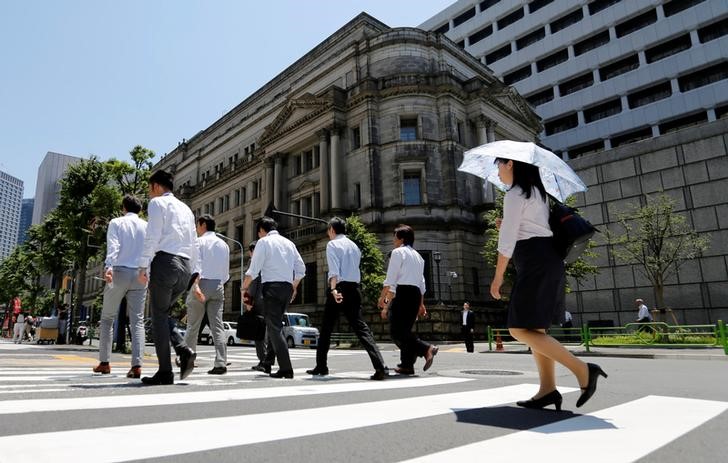By Leika Kihara
TOKYO (Reuters) - Japan's central bank is already in the process of winding down its radical monetary policy and may also look at making changes to its long-term interest rate target in the near future, former board member Takahide Kiuchi said on Monday.
While Governor Haruhiko Kuroda may persist in achieving his 2 percent inflation target, BOJ bureaucrats working under him will seek to water down the target as Kuroda's term expires next April and the cost of its massive stimulus rises, Kiuchi said.
"The BOJ has already begun normalizing policy since it shifted to yield curve control (YCC) last year, and that's the direction the bank seems to heading," he told Reuters.
Kiuchi, who finished up his tenure as board member in July, was a sole proponent of tapering the BOJ's asset purchases and long warned of the pitfalls of Kuroda's monetary experiment.
Many of Kiuchi's criticisms have now gained support among some market participants, lawmakers and central bankers, including his caution over setting a binding timeframe for hitting the BOJ's elusive price target.
With inflation still subdued despite years of ultra-loose policy, the BOJ could re-define its inflation target to a more flexible one aimed over a longer timeframe, said Kiuchi, who is now executive economist at Nomura Research Institute.
The BOJ may also switch its long-term interest rate target to one targeting three- or five-year yields from the 10-year yield, as the shorter end of the curve is easier to control with fewer bond purchases, he added.
"YCC is a very fragile framework that won't be sustainable once the economy is hit with an external shock," Kiuchi said.
"Reviewing YCC and targeting yields for bonds with a shorter duration is one option. It's quite possible this could happen."
Under a policy framework adopted last September, the BOJ guides short-term rates to minus 0.1 percent and the 10-year bond yield around zero percent.
The BOJ also has a loose pledge to buy bonds so its holdings increase at an annual pace of 80 trillion yen ($728.73 billion). But it has recently been slowing purchases to around 60 trillion yen as its huge purchases drain bond market liquidity.
Kiuchi warned the BOJ must further slow its buying to around 45 trillion yen per year, as the current pace of 60-trillion-yen would mean purchases hit the limit around mid-next year.
If the economy needs further monetary support, the only step left for the BOJ could be to abandon YCC and ramp up bond buying to finance big fiscal spending by the government, he said.
"There's not much left monetary policy can do to prop up the economy, and the cost of ultra-easy policy is becoming huge."
